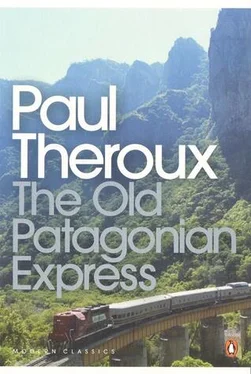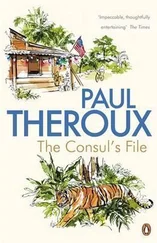Paul Theroux - The Old Patagonian Express - By Train Through the Americas
Здесь есть возможность читать онлайн «Paul Theroux - The Old Patagonian Express - By Train Through the Americas» весь текст электронной книги совершенно бесплатно (целиком полную версию без сокращений). В некоторых случаях можно слушать аудио, скачать через торрент в формате fb2 и присутствует краткое содержание. Год выпуска: 2008, Издательство: Penguin Books Ltd, Жанр: Путешествия и география, на английском языке. Описание произведения, (предисловие) а так же отзывы посетителей доступны на портале библиотеки ЛибКат.
- Название:The Old Patagonian Express: By Train Through the Americas
- Автор:
- Издательство:Penguin Books Ltd
- Жанр:
- Год:2008
- ISBN:нет данных
- Рейтинг книги:5 / 5. Голосов: 1
-
Избранное:Добавить в избранное
- Отзывы:
-
Ваша оценка:
- 100
- 1
- 2
- 3
- 4
- 5
The Old Patagonian Express: By Train Through the Americas: краткое содержание, описание и аннотация
Предлагаем к чтению аннотацию, описание, краткое содержание или предисловие (зависит от того, что написал сам автор книги «The Old Patagonian Express: By Train Through the Americas»). Если вы не нашли необходимую информацию о книге — напишите в комментариях, мы постараемся отыскать её.
The Old Patagonian Express: By Train Through the Americas — читать онлайн бесплатно полную книгу (весь текст) целиком
Ниже представлен текст книги, разбитый по страницам. Система сохранения места последней прочитанной страницы, позволяет с удобством читать онлайн бесплатно книгу «The Old Patagonian Express: By Train Through the Americas», без необходимости каждый раз заново искать на чём Вы остановились. Поставьте закладку, и сможете в любой момент перейти на страницу, на которой закончили чтение.
Интервал:
Закладка:
The people in the train did not look out of the window, except at the stations, and only then to buy grapes or bread. One of the virtues of train travel is that you know where you are by looking out of the window. No sign-boards are necessary. A hill, a river, a meadow — the landmarks tell you how far you have come. But this place had no landmarks, or rather, it was all landmarks, one indistinguishable from the other — thousands of hills and dry riverbeds, and a billion bushes, all the same. I dozed and woke; hours passed; the scenery at the window did not alter. And the stations were interchangeable — a shed, a concrete platform, staring men, boys with baskets, the dogs, the battered pick-up trucks.
I looked for guanacos. I had nothing better to do. There were no guanacos. But there were other creatures — birds of all sorts, small twittering ones, swifts and sparrows, and dark falcons and hawks. Patagonia is, if nothing else, a bird sanctuary. There were owls here, too, and nearer the Andes great eagles; and, in the far south, albatrosses of enormous size. The ugliness of the landscape continued without let-up, and I had no wish to stir from this train. 'Here also we are grateful to the train, as to some god who conducts us swiftly through these shades and by so many hidden perils,' wrote Robert Louis Stevenson. 'So lightly do we skim these horrible lands; as the gull, who wings safely through the hurricane and past the shark.'
The fellow across the aisle was sleeping. I looked at him and the others, and I was struck by their resemblance to me. I had decided quite early in my trip that I was an implausible traveller — no credit cards, no rucksack. I was not well-dressed enough to be a tourist on a ten-day jaunt through ruins and cathedrals; nor was I dirty or frazzled enough to be a wanderer. People asked me what I did, and when I said \I was a geography teacher ('Easter vacation!') they doubted me. I mentioned my wife and children: but why was I here and they there? I had no ready answer to that one. Tourists regarded me as a backslider, wanderers seemed to think I was an intruder, and natives did not understand me. It was hard to convince anyone that I did not have an ulterior motive, that I wasn't on the run, a con-artist, a man with a scheme. I had a scheme — that was the worst of it — but I did not wish to disclose it. If I had told Thornberry, or Wolfgang, or the lady in Veracruz, or Bert and Elvera Howie, that I was a writer they would have either bolted or, as Bert Howie phrased it, 'put a couple of layers of shit in my ear'.
But on this train, the Old Patagonian Express, I looked like everyone else; slightly unshaven, fairly presentable, with a battered suitcase, vaguely European, moustache drooping, scuffed leakproof shoes. It was a relief. I was, at last, anonymous. But what a strange place to be anonymous in! I blended with the foreground. But what a background! Amazing: I belonged on this train.
The boy woke.
'How far to Norquinco?' he asked.
'I don't know,' I said. They all look the same to me.'
The man behind me said, 'About two hours.'
He did not gesture out of the window. He looked at his watch. The landscape was no help in determining where we were.
The boy's name was Renaldo. His surname was Davies — he was Welsh. This part of Patagonia was full of Joneses, Williamses, Powells and Pritchards, Welsh families who had migrated across the plateau from Rawson and Trelew and Puerto Madryn with the intention of founding a new Welsh colony. They are tough, independent and undemonstrative people, not the singers and dreamers one associates with Wales, but a different breed altogether, church-goers, sheep farmers, tenaciously Protestant, with a great sentiment for a homeland they have never seen and for a language few speak. (A classic of Welsh literature is called Dringo'r Andes — 'Climbing the Andes' — by the Welsh woman Eluned Morgan, who was born in the Bay of Biscay during the great migration.) Renaldo wanted to speak English, but his English was unintelligible to me, and so we spoke Spanish.
'I learned English on a cargo ship,' he said. 'That is not a good place to learn English.'
He had been on a ship for two years, and now he was on his way home.
'If you were on a ship,' I said, 'you must have been to Boston.'
'No,' he said. 'But I was all over America. The whole continent.'
'New York?'
'No.'
'New Orleans?'
'No.' And now he looked puzzled. 'America — not the United States.'
'South America?'
'That's right — all over it. All over America,' he said. 'And Asia — Singapore, Hong Kong. And Bombay. And Africa — Durban, Capetown, Port Elizabeth. I have been everywhere.'
The ship he had sailed in was Peruvian, but the crew was mainly Chinese and Indian — 'the other Indians, different from ours. I liked them, more or less. They talked, we played cards. But the Chinese! I hated them! They look at you — they don't say anything. If they want something, they just' — he snatched with his hand. 'Grab, grab, that's all they do.'
I asked him what his impression had been of South Africa. His reply surprised me.
'South Africa is a very bad place,' he said. 'Very pretty, but the society there is cruel. You won't believe me, but they have signs here and there that say "Only for Whites". Taxis, buses, shops — "Only for Whites". The white people go here, the black people go there. Strange, isn't it? And most of the people are black!' He reported this more in wonderment than in outrage, but he added that he did not approve.
Why not? I asked.
'It's no good. "Only for Whites", "Only for Blacks",' he said. 'It's a stupid system. It shows they've got big problems.'
I was encouraged that a Patagonian with no education could show such discernment. I said, 'I agree.'
He said, 'I'd rather spend my life in Barranquilla than Durban. And Barranquilla is really awful.'
That's true,' I said. 'I was in Barranquilla. I hated it.'
'Isn't it a pig-pen? A really ugly place.'
They were having an election when I was there.'
They have elections? Ha!' he said. There is nothing there at all!'
He was chortling, thinking of Barranquilla. I looked past him, out of the window at the dune-like hills and the low bushes, the blinding sun, the puffs of dust thrown up by the train. There was a condor — condors didn't flap their wings — circling in the distance. The Patagonian's disgust with Barranquilla was a hatred of slow decay, of mildew and insects. Here nothing rotted. A dead thing was quickly a dry carcass — it shrivelled and was bones. There was no humidity, nothing stagnant. It was desert cleanliness, the rapid destruction by sun and arid air, a dehydrated wilderness, a fossil on the planet's flank. Few live things had survived here, but those that had were practically indestructible.
'So you have seen the world,' I said. 'But why are you going home?'
'Because I have seen the world,' he said. There is nowhere like this. I am going to get a job, maybe building houses or fixing engines. In Norquinco or Esquel.'
'I am going to Esquel,' I said.
'It is quicker to take the bus from Bariloche.'
'I wanted to take the Patagonian Express,' I said.
The old one!'
When we arrived at Norquinco and he pulled his suitcase to the door, he said, The Queen of England — you know who I mean?'
'Queen Elizabeth? What about her?'
'She owns a ranch just outside Esquel. Lots of cattle — very nice.'
I spent the afternoon on that train as I had spent afternoons on trains all the way through the Americas. I remembered people who had been cruel to me; I rehearsed cutting remarks that I should have uttered; I recalled embarrassments in my life; I re-ran small victories and large defeats; I imagined being married to someone else, having children, getting divorced; I elected myself president of a banana republic and tried to cope with a noisy Opposition; I went to medical school and set up in practice and carried out tricky operations; I told a long humorous story to a large gathering, but in the end the prize went to someone else. I died, and people talked very loudly about me. It was a fairly typical afternoon of travelling.
Читать дальшеИнтервал:
Закладка:
Похожие книги на «The Old Patagonian Express: By Train Through the Americas»
Представляем Вашему вниманию похожие книги на «The Old Patagonian Express: By Train Through the Americas» списком для выбора. Мы отобрали схожую по названию и смыслу литературу в надежде предоставить читателям больше вариантов отыскать новые, интересные, ещё непрочитанные произведения.
Обсуждение, отзывы о книге «The Old Patagonian Express: By Train Through the Americas» и просто собственные мнения читателей. Оставьте ваши комментарии, напишите, что Вы думаете о произведении, его смысле или главных героях. Укажите что конкретно понравилось, а что нет, и почему Вы так считаете.












